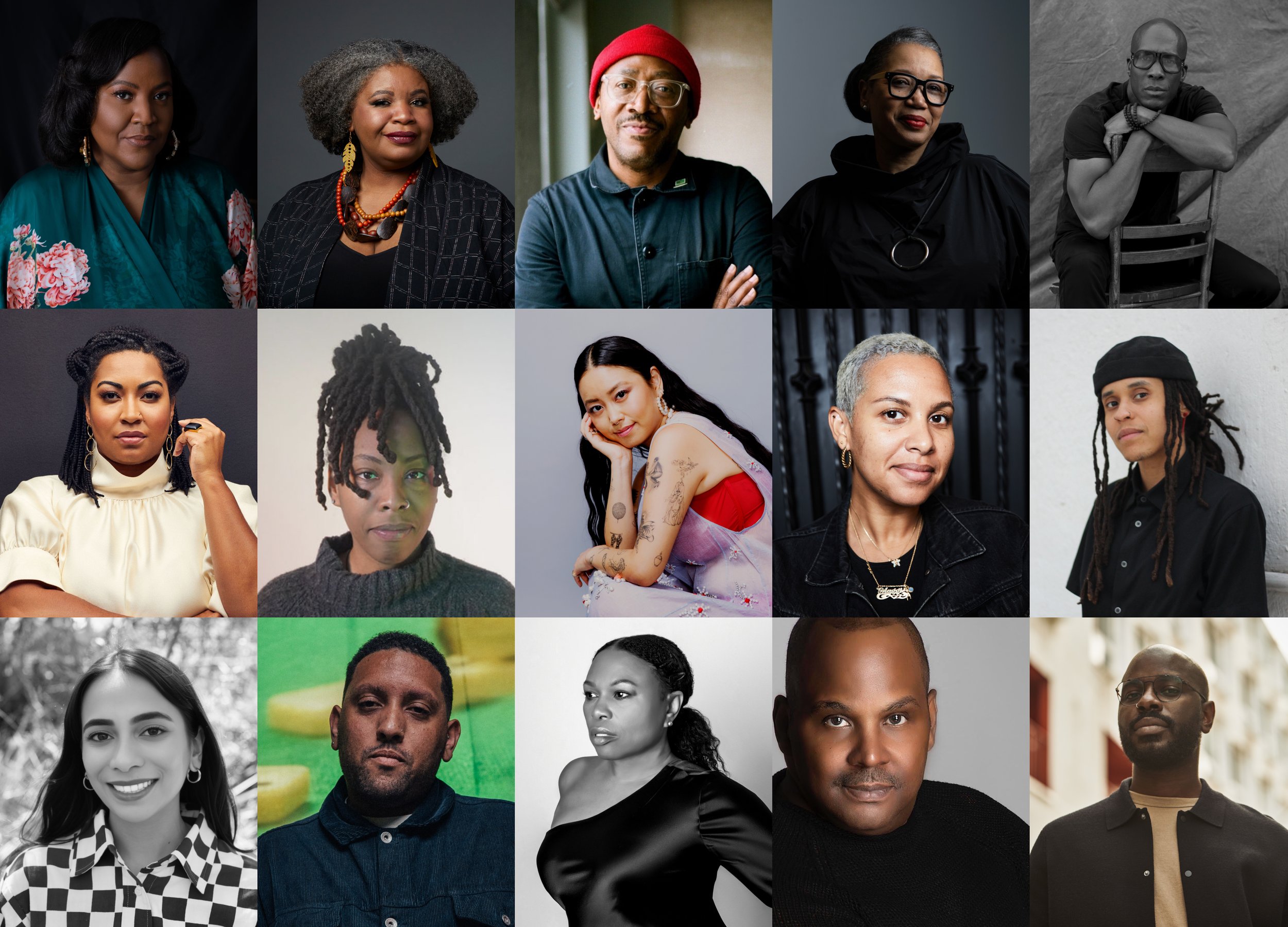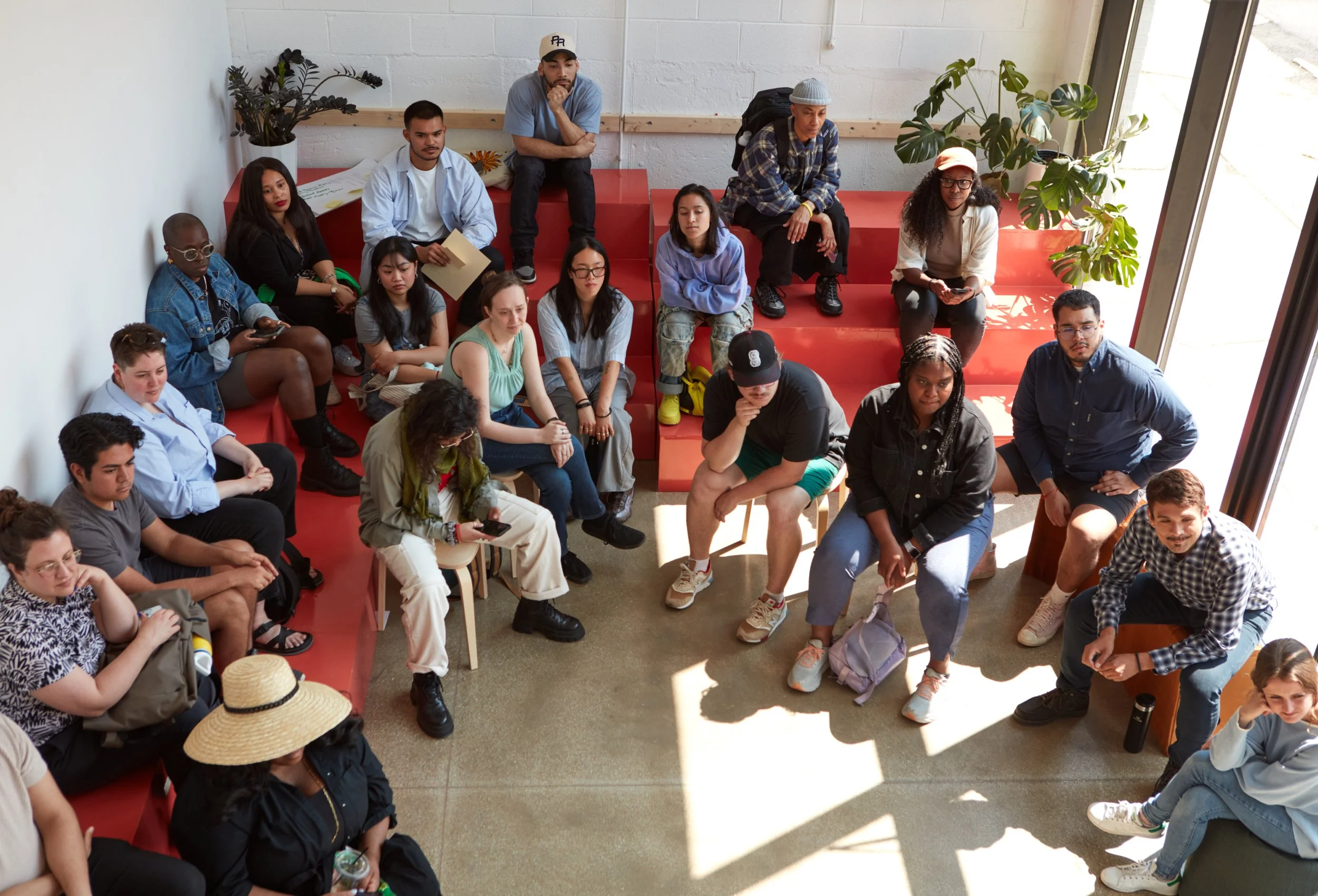In continuation with last year’s tremendous inaugural gathering, this hybrid in-person/online event was co-hosted by the MCA Chicago on May 17, 18, and 19, 2024.
We expanded on the guiding premise of dignity as the intrinsic lens for liberatory design practices with two days of presentations and conversations, as well as interactive workshops and on-site experiences happening both at the museum and throughout the city of Chicago. You can find the specifics of our program below.
We once again brought together innovative and acclaimed artists, designers, scholars, and organizers to reflect on a range of design-related topics, disciplines, methodologies, and agendas. We also hosted our Reference Room, located at the MCA, to provide a public gathering space in which anyone could encounter and experience reading materials that inspired our five print issues.
In addition to a full day of programming on Saturday (May 18), this year we co-produced four interactive workshops, which happened at various locations throughout the city on the 17th, 18th, and 19th. Thank you to our awesome workshop collaborators and hosts Brandon Breaux (@bbreaux), Englewood Arts Collective (@englewoodartiscollective), Territory NFP (@territorynfp), & Mobile Makers (@mobilemakers_chicago). These experiences were separate from general Symposium ticketing.

From top left, this year’s symposium speakers: Tricia Hersey, Dr. Dori Tunstall, Norman Teague, Cheryl S. Durst, Marquise Stillwell, Rachel Cargle, Andrea Yarbrough, Jezz Chung, Marguerite Wynter, Ciera Alyse McKissick, Ami Mehta, Joseph Henry, DJ Lady D, Frederick Dunson, and Nu Goteh.
Symposium Programming
Friday, May 17
Reference Room opened
Conversation
Artist and designer Norman Teague and International Interior Design Association Executive Vice President and CEO Cheryl S. Durst exchanged ideas around ontologies of beauty within the design industry, and how to build practical and theoretical frameworks for more liberated aesthetic languages. This intimate conversation to kickoff our program was moderated by Deem cofounder Marquise Stillwell.
Saturday, May 18
Keynote
Tricia Hersey—the visionary founder of The Nap Ministry, an organization that uplifts rest as a form of resistance—shared an immersive daydreaming activation while exploring the power of designing rest as a practice of love, liberation, and community care.
Conversation
Writer, entrepreneur, and philanthropic innovator Rachel Cargle, multidisciplinary artist, curator, and educator Andrea Yarbrough, and multidisciplinary artist and author Jezz Chung, with moderation from curator and arts administrator Marguerite Wynter, spoke on designing for and through healing, and the vital modalities of restoration and transformation.
Expansive Practice Presentation
How can video games inspire positive change in a world facing uncertain futures? Creative technologist, artist, and educator Ami Mehta explored how game design, storytelling, and social impact can intersect to address issues across representation, climate change, cultural preservation, and community collaboration.
Expansive Practice Presentation
Independent curator, gallerist, and space-shifter Ciera Alyse McKissick shared how she has built platforms, connections, and partnerships that center the needs of artists and communities. Expanding on the intersections of interdisciplinary art practices, journalism, and public engagement, she illustrated how her various projects have helped shape the ways that audiences interact with, view, and experience art in unconventional ways.
Conversation
Frankie Knuckles Foundation Founder, President, and Executive Director Frederick Dunson, DJ, producer, remixer, and music publisher DJ Lady D, and designer and curator Joseph Henry, with moderation from Deem cofounder and creative director Nu Goteh, examined the dynamic relationship between sound and spatial practices, with particular attention to Chicago’s music culture history.
Endnote
In her talk, “Decolonizing Design: Designing for Liberatory Joy,” Dr. Dori Tunstall closed the day by addressing two aspects of decolonizing design: putting Indigenous first and dismantling the racist bias in the European modernist project in design.
Sunday, May 19
Reference Room remained open through end of day

Participants at a workshop hosted by Mobile Makers Chicago. Photo by Sara Pooley.
Workshops
Friday May 17, 1–3pm
Envisioning Liberation in Changing Communities
with Mobile Makers
Members joined Mobile Makers for an experiential workshop about place-keeping, third space, belonging, and leveraging design to make positive change in the built environment. Participants learned about the Humboldt Park and Logan Square communities and how developments like the rails-to-trails project “The 606” have spurred gentrification and displacement. Through a neighborhood walk, group discussions, and art making, participants were prompted to envision liberatory futures for the changing communities across our nation.
Saturday May 18, 12–4:30pm*
UnBlocking Injustice—It’s NOT A Game®
with Englewood Arts Collective
Can reparative design solutions for harmed communities be...fun? Englewood Arts Collective invited Symposium guests to reimagine futures for the Greater Englewood neighborhood with a hands-on activity that has a hyper-local focus. Taking one residential block, centering homeowner’s needs—with vast possibilities and restrictions—EAC challenged us to co-configure a visual action plan of restorative justice, with Arts funding as the fuel. Using the actual city block they will be beautifying as part of Tonika Johnson’s restorative unBlocked Englewood project as a “gameboard,” participants were invited to explore what it’s like to ideate urban planning as an artist—with dignity for residents as their guide.
*This workshop functioned as a drop-by style table outside the auditorium for any Symposium attendees to visit and engage with between Saturday’s programs.
Sunday May 19, 10–11:30am
Sunday Morning Reset: Meditation as a Creative Clearing Practice
with Brandon Breaux
This workshop began with a brief introduction to artist Brandon Breaux’s creative practice, followed by a meditation and breathing exercise with the intention of opening up the group to the possibility of reframing how we engage with and at conferences. In order to use design as a problem solving tool, we must expand our capacities to see things differently. We live in a world that heavily relies on domain expertise, but sometimes domain expertise, or being committed to a particular view, limits our possibility to develop creative solutions. This workshop was an exercise designed to facilitate guests’ processing of their experiences of the weekend from a different and more open place. Coffee and pastries were served.
Sunday May 19, 1-3pm
Opening the Gates: Restorative Design Justice In Practice
with Territory
Opening the Gates was an intergenerational gathering of designers, Austin neighborhood residents, community partners, West Side youth, and Deem Symposium guests with the goal of challenging ourselves to co-design a new community asset without gatekeeping or assumptions of insider knowledge. This workshop centered around the real opportunity to develop city-owned land at 557 N Central Avenue, and throughout the Austin community. Territory is working to create a Restorative Design Justice practice based on the free exchange of ideas among a diverse group with a mutual commitment towards acknowledging harm embedded in urban design, and using design to make our community whole again. The experience included a presentation by members of Territory around the significance of place in this context, restorative justice strategies, and breaking bread.
Participants registered for workshops individually through our Eventbrite page. Participation was limited to 20 guests each.
This symposium was part of Art Design Chicago, a citywide collaboration initiated by the Terra Foundation for American Art that highlights the city’s artistic heritage and creative communities. It was funded by the Terra Foundation for American Art.
